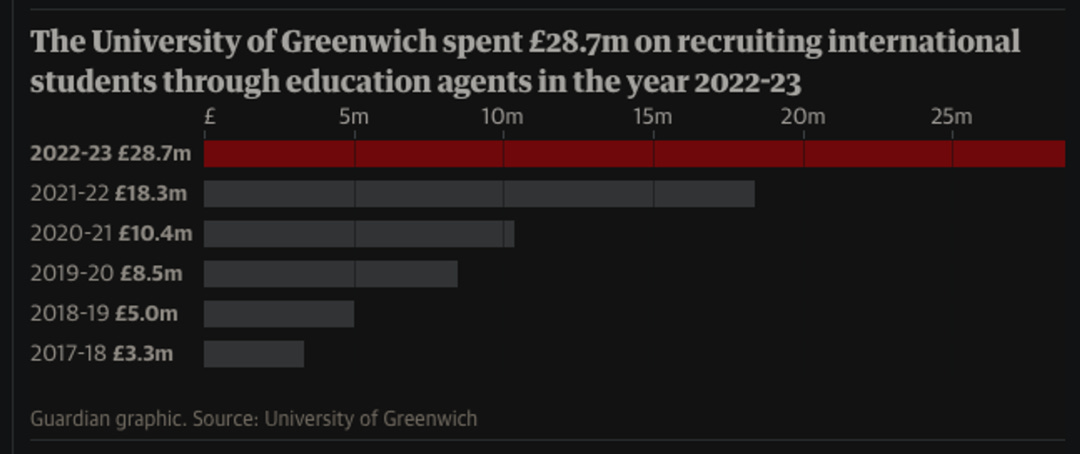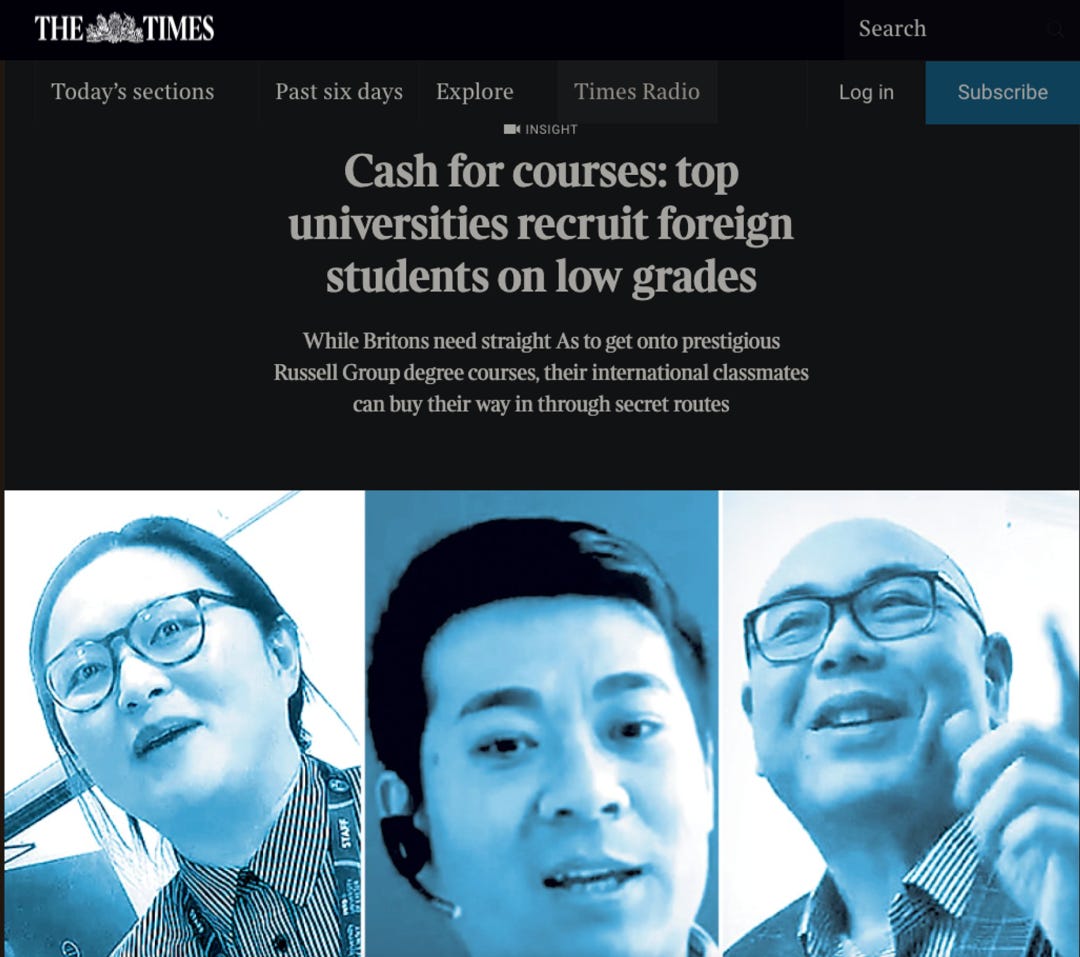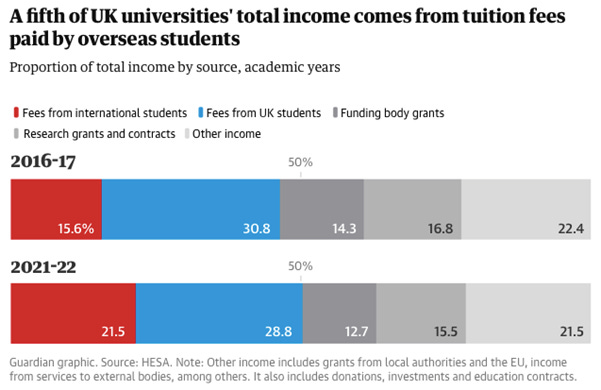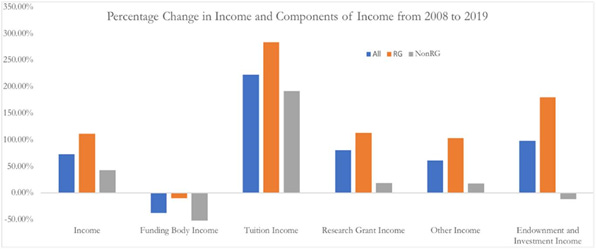Chinese Parents Perceive British Degrees as Devalued
The previously universally welcoming and sometimes criticized as "easy" British study abroad experience may be approaching a turning point.
The Over-Commercialization of British Universities
The commercialization of British university education is almost an open secret, with international students becoming the undisputed financial backbone. To maximize commercial gains, universities have employed a variety of recruitment strategies.
Many British universities have been exposed for collaborating with agents, effectively purchasing students, resulting in substantial profits for both parties. In November of last year, a report by The Guardian investigated 20 British universities and found that, due to a lack of formal regulation, some agents were incentivized by commissions to steer students towards universities and courses they were not interested in. Some agents even assisted students in falsifying bank documents to bypass visa regulations.
Greenwich University was found to be the most heavily involved in such collaborations, spending over £28.7 million (¥250 million) on education agents and related taxes in the 2022-23 academic year. This significant expenditure brought in 6,572 international students, with an average cost per student of £4,368. The total tuition fees collected undoubtedly far exceeded the £250 million spent.
The lure of significant financial gains has led agents to potentially place underqualified students into British universities.
In January of this year, an undercover investigation by The Sunday Times revealed that while top British university courses typically require straight A grades for admission, many international students could "buy" their way in. Even students with significantly subpar grades could pay up to £38,000 in tuition fees to gain entry through "international foundation programs," leading to admission into some of the UK's top universities, including Durham University and the University of Exeter.
This revelation caused an uproar in the British education sector, prompting the Department for Education to immediately announce an investigation into the alleged misconduct of overseas education agents involved in recruiting international students.
Graduate Visa Scrutiny
With the influx of international students into the UK, while financial revenues have increased, new challenges have also emerged.
A survey by Universities UK indicates that over 320,000 international students now make up nearly half of the student body in British universities, each paying an average annual tuition fee of about £17,000.
Faced with a steady stream of international students bringing cash to the UK, the British government has long been welcoming. In 2022 alone, the UK issued over 500,000 student visas, a 23% increase from the previous year and double the number issued in 2019.
If the primary attraction of international students to the UK is "increased revenue," then one of the key factors drawing them, aside from educational quality, is the "Post-Study Work visa" (PSW).
After completing their studies, international students can apply for a PSW visa, allowing them to stay in the UK for two more years to work or seek employment without the need for sponsorship from educational institutions or employers, and without needing a certificate of sponsorship. The PSW visa permits holders to bypass the usual work visa route's salary and other requirements, enabling them to take on jobs of any salary threshold and skill level.
Indeed, the convenience of the PSW visa has proven effective in attracting more international students. Data from Universities UK revealed that the appeal of the PSW visa contributed to an increase of over 600,000 international student enrollments between the 2019/20 and 2023/24 academic years, bringing more than €60 billion in revenue to the UK economy.
This year, the UK government seems to be tightening visa policies for international students.
In January, international students pursuing a master's degree were banned from bringing family members to the UK. As a result, data from over 60 UK universities show that the number of student visas issued this year has decreased by 33% compared to the same period in previous years, and postgraduate enrollments have dropped by more than 40%.
International Students Leaving the UK?
In response to the UK government's scrutiny of graduate visas, the findings released on May 14 concluded: "There is no evidence that the UK graduate visa route is being abused, nor does it undermine the integrity and quality of UK higher education."
New policies are now targeting unscrupulous agents. International students will face mandatory English tests after graduation, and universities with high dropout rates may lose their licenses to recruit overseas students.
It is becoming increasingly apparent that the UK's educational policies are gradually shifting from earlier openness to a more restrictive approach. Recently, UK Prime Minister Rishi Sunak, who is of Indian descent, declared on social media, "The number of immigrants is too high. Today we will take more aggressive action to overturn this, including banning overseas students from bringing their families to the UK."
Will the Number of Students Studying in the UK Continue to Surge?
According to a report by the South China Morning Post, over the past three years, top Chinese students have increasingly opted out of studying in the UK and the US, with other European countries rapidly becoming new popular destinations for higher education.
The latest report from the UK's university admissions service, UCAS, published in May, indicates that the number of undergraduate applications from China has declined for the first time in a decade, dropping from 33,660 in 2022 to 33,195 in 2023. Additionally, this spring, UK universities have experienced a stagnation in international student admissions.
A survey by the UK Council for International Student Affairs (UKCISA) of 75 institutions found that 90% of the institutions reported a decrease in international applications for the next academic year. Applications for postgraduate taught courses have dropped by 27% compared to last year, and over 40% of UK universities are expected to face budget deficits this year.
Rather than interpreting this visa-driven turmoil as "the UK not welcoming international students," it is more accurate to view it as the "UK study abroad inflation bubble returning to normal."
For international students, a gradually clearing study environment and universities that prioritize genuine education are the best long-term choices.









